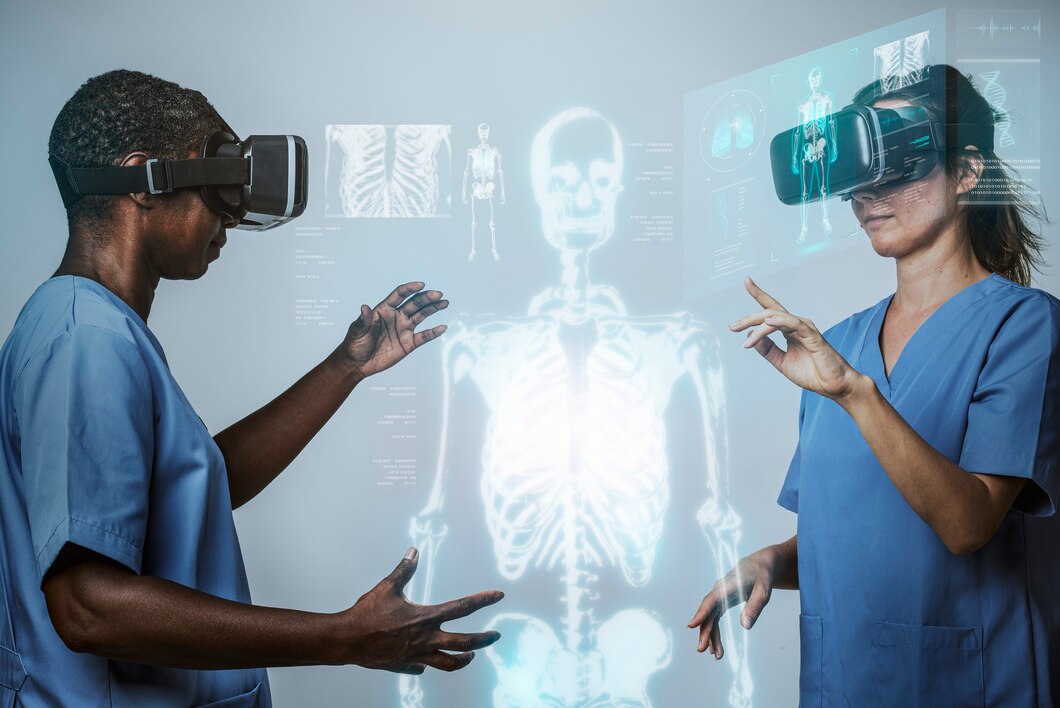The Benefits and Challenges of Generative AI in Healthcare
 Prashant Pujara
Prashant Pujara
Introduction
Various industries are now seeing a steep uptake into generative AI, and the healthcare industry is no exception. This advanced technology enables algorithms to generate information and provide decision making on their own and has the potential to transform patient, diagnosis, and treatment.
The current global AI in healthcare market is $20.9 billion and it is expected to grow approx to $148.4 billion by 2029. However, there are also other risks that are connected with them and should be taken into account. This article provides information on the benefits as well as the risks of implementing generative AI within the healthcare system.
Understanding Generative AI
In simple terms, generative AI is a form of artificial intelligence where machines learn patterns to create new data from the existing data. However, the traditional AI depends on the preprogrammed set of rules and does not increase or produce new information.
How Generative AI Works
Generative AI refers to AI that can create new data or content and includes models like GAN and VAE. These models are trained from a huge dataset and find structure in data so as to be able to create more data of similar nature. For example, GANs are composed of two model types: generator and discriminator that aim at producing natural images.
Applications of Generative AI in Healthcare
Diagnostic Imaging and Analysis
Generative AI helps to improve the diagnostic imaging by processing the interpretation of results, the medical images. It can analyze X-ray images, MRI, and CT scans. Also, it can identify pathologies more accurately than radiology experts.
Drug Discovery and Development
The application of artificial intelligence in the discovery of drugs is beneficial in the identification of the drug discovery. AI generative models can emulate the molecular structure or behavior of any of the new drugs to be developed with reference to the body and are far less time-consuming and costlier than the traditional models.
Personalized Medicine
Generative AI can assist in creating individual treatment programs for each patient. With the help of data regarding genetic predispositions and family medical histories, AI can suggest the most effective treatments and practices to apply.
Virtual Health Assistants
AI solutions in virtual health assistants include chatbots or avatars, medical consultations, personalized reminders and even emotional support around the clock. Such assistants can deal with basic queries, therefore leaving healthcare professionals to address critical issues.
Predictive Analytics in Healthcare
Generative AI can forecast disease occurrences, patients’ deterioration, and even treatment success rates. Thanks to big data, the AI models can, for example, find out patterns and correlations which humans might not picture out.
Advantages of Generative AI in Healthcare
Enhanced Diagnostic Accuracy
Generative AI enhances the accuracy of diagnosis by analyzing the images of the patients and other related data more effectively. This results in early disease identification and improved patients’ management.
Accelerated Drug Discovery
AI reduces the time taken to discover a new drug from the research stage to clinical trials. This acceleration is important especially when addressing emerging threats to health.
Personalized Treatment Plans
Generative AI helps improve the efficiency of treatment by adapting the treatment plans accordingly to the patient’s profile. Personalized medicine increases patient satisfaction and minimizes side effects of treatments.
Cost Reduction
The use of artificial intelligence in the management and operations of healthcare eliminates the need of excessive manpower and hence greatly reduces operating expenses. This makes high quality health care services more available and affordable.
Improved Patient Engagement
The generative AI to build patient engagement as it delivers personalized health information in a controllable manner. This leads to patient autonomy, where they become active participants in the treatment of their sickness.
Challenges and Limitations
Data Privacy Concerns
The usage of big data has various limitations and challenges particularly the data privacy concerns. Probably one of the biggest challenges is to protect patients’ information and conform to the stipulations of laws like the GDPR.
High Implementation Costs
One of the main weaknesses of generative AI systems is their relatively high cost during implementation. The operational characteristics of healthcare institutions require heavy investment in technology and training, which is costly for small providers.
Ethical and Legal Issues
The application of artificial intelligence in the healthcare sector poses issues of how decisions are made and to whom, accountability and bias. Unfortunately, the legal systems are still rather weak and fail to adequately address such issues.
Reliability and Accuracy Issues
It is important to understand that the AI systems are not perfect; they can improve accuracy but are not devoid of errors. Thus, it is obligatory to guarantee that data obtained with the help of artificial intelligence do not contain any errors to avoid mistakes.
Lack of Human Touch
AI does not possess human emotions or feelings as we find with human health care providers. AI-driven operations are efficient in a healthcare setting, but its implementation must be balanced with the interaction patients prefer with clinical staff.
The Future of Generative AI in Healthcare
Emerging Trends
Some of the trends in the AI-based health sector include Artificial Intelligence with IoT devices, telemedicine, and the application of natural language processing.
Potential Breakthroughs
Future possibilities could be integrated robotic surgical procedures performed by AI, continuous health tracking, and AI-assisted mental health counseling systems.
Predictions for the Next Decade
Looking at the next ten years, AI shall continue to make deeper encampments in healthcare delivery with precision in diagnostics, individualized therapies and optimized processes.
Conclusion
It is concluded that generative AI has tremendous applications in health care by increasing the diagnostic capabilities, shortening the cycle of drug development, and forming bespoke treatment plans. However, issues of data privacy, high costs of implementation, and some ethical questions have to be faced. As the usage of artificial intelligence technology grows, the capacities of retaining human connection and incorporating AI into the process will be very sensitive for success.
Subscribe to my newsletter
Read articles from Prashant Pujara directly inside your inbox. Subscribe to the newsletter, and don't miss out.
Written by

Prashant Pujara
Prashant Pujara
Prashant Pujara, CEO at MultiQoS, a prominent software development company, assists international enterprises in expanding through innovative and compelling business solutions. With more than 15 years of expertise, he is highly respected for his visionary leadership and exclusive guidance in developing successful business tactics and driving technology advancements geared toward the future.